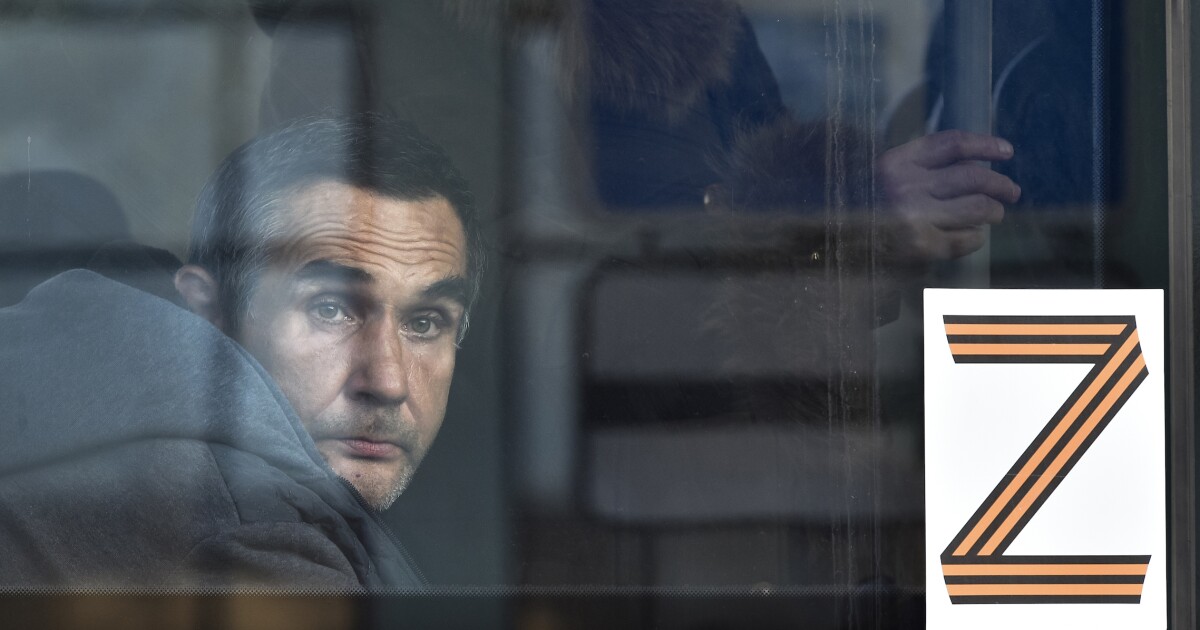

A major Russian military force faces a crisis in southern Ukraine, according to Western officials who expect Ukrainian troops to liberate the crucial city of Kherson in the coming weeks.
“They are creating circumstances where Russians have two options: either to retreat or to die because they don’t have additional equipment,” a senior European official told the Washington Examiner.
Ukrainian officials have worked to present Russia with that agonizing choice during a fall counteroffensive characterized by effective use of artillery and step-by-step offensives by small infantry units. Russian forces tasked with holding the Kherson region’s namesake capital city must contend not only with the methodical opponent before them, whose efficacy has been described even by Russian military analysts, but also the logistical problems that arise from the mighty Dnieper River that bisects the Kherson region and divides them from their supplies further east.
“They will be evacuating pretty soon,” another senior European official predicted. “There is [an army], some 20,000-strong army on this right bank of the river — a Russian army with proven, elite troops — without proper supplies. … If they let them be encircled by the Ukrainian army, they could lose their most valuable troops there.”
PUTIN ‘WORRIED’ ABOUT SOUTH KOREA SENDING WEAPONS TO UKRAINE
Ukrainian President Volodymyr Zelensky, for his part, doubts that Russian President Vladimir Putin will authorize such a withdrawal. “They are not actually ready to leave the region yet, even if they risk being surrounded by our troops,” he said, according to an unofficial translation of an interview with Italy’s Corriere Della Sera. “Russians keep their best units in place.”
The Ukrainian assessments suggest that Kherson could be a crucible for Ukrainian forces as well as the Russians, even in the event of Ukrainian victory.
“The Russians know how to fight,” Ukrainian Maj. Roman Kovalev, a Kherson-bound battalion commander, told NPR. “They learn fast. They’re not the same forces as they were in the spring. It is hard to fight them.”
An intense struggle would be consistent with the strategic significance of Kherson. The city is a key waypoint for Ukrainian officials hoping eventually to drive Russian troops out of the Crimean Peninsula, which Putin annexed in 2014. And Russian forces have treated it as a gateway to the rest of the Black Sea coastline, including major port cities that power the Ukrainian national economy.
“It will be a blow for their plans, a really serious blow, to take Odesa,” the first senior European official said. Ukrainian and Western officials blunted that line of attack months ago, but “the guy in Moscow has not” given up the dream, the official added.
Putin has given a ferocious, yet indirect, response to Ukraine’s counteroffensive. Russian forces, aided by Iran, have conducted intense and sustained attacks on a nationwide array of Ukrainian energy infrastructure. Russian diplomats have reinforced that campaign with “dirty bomb” allegations perceived in Kyiv and Western capitals as a thinly veiled threat to use nuclear weapons.
“Of course, the political will of Putin is to keep it as long as possible because that would be a huge blow to his image,” the second senior European official said. “So in this situation, the Russian command is in a desperate situation, between the political will of Putin to keep this territory and the military necessity to release it as soon as possible.”
In any case, Putin’s tactics in recent weeks have not stymied the Ukrainian maneuvers in Kherson.
“The Ukrainians are picking up speed, are moving more quickly than they had been for the past month in Kherson Oblast — toward and surrounding Kherson city,” former U.S. Ambassador to Ukraine Bill Taylor said. “The city, of course … is on the right bank, is on the west bank of the river. Those bridges have been damaged by HIMARS, we know, for weeks now.”
Ukrainian forces have used a combination of U.S.-made multiple-launch rocket systems (known as HIMARS), howitzers, and commercial unmanned aerial drones to target Russian heavy weaponry and storage sites. The targeted strikes have helped to offset the numerical advantage that Russian artillery forces were expected to enjoy.
“There is an idea the Russian army is infinite, but it is a myth,” a Ukrainian artillery major in Kherson told the New York Times. “The intensity of fire has fallen by three times. It’s realistic to fight them.”
Russian forces reportedly are preparing for “a potential retreat” across the river.
“According to available information, the enemy is setting up defensive positions on the left bank of the Dnieper in the Kherson oblast,” Ukrainian military officials said in an operational update released last week. “For example, in the area of the settlement of Hornostaivka, engineering and sapper units of the Russian occupying forces mine the coastline, leaving small passages for a potential retreat of their troops from the right bank.”
Officials with Russia’s occupation government have called for an “evacuation” of civilians from the area, though the operation is beset by allegations that Russian officials are forcing Ukrainian citizens to leave for Russia.
“As a feature, the evacuation of the civilian population from certain settlements of the left-bank part of the Kherson oblast was noted,” the Ukrainian General Staff added in another update. “According to the available information, since October 31 of the current year, the removal of collaborators with their families, medical personnel and equipment from the central district hospital has started from the settlement of Hornostaivka.”
The apparent details of the Russian preparations leave local Ukrainians apprehensive. “It looks really odd on the ground,” said Dr. Hanna Shelest, a Ukrainian foreign policy expert based in Odesa and in contact with Ukrainians in Kherson. “They took all the weapons to the left bank and [then] turned them to the side of the city. So the locals have the feeling that Russians at least will try to do a second Mariupol … in terms of maximum damage to the city, in case they need to leave it.”
Zelensky has signaled that Ukrainian forces are determined to liberate Kherson, whether Russian troops withdraw or stay and fight.
“Of course we will,” he told the Italian publication. “But the price is high, it costs dead and we give a burden to people’s lives. We ask for more weapons to save the lives of our soldiers, while the Russian army does not have many problems in having its men massacred at the front.”
Yet Ukrainian commanders have acquired a reputation for patience. “They do not hurry, and they do not throw their people actually simply to be killed — because, really, Russia has very strong units on that side,” the second senior European official said. “But the main problem for them is these units are cut off from the rest, and they’re cut off from … logistical lines. So they are in a really desperate situation.”
If Zelensky has downplayed the purported Russian withdrawal as “theater only” designed to bait Ukraine, it’s also true that some of Ukraine’s closest allies aren’t sure where Kyiv will strike next.
CLICK HERE TO READ MORE FROM THE WASHINGTON EXAMINER
“Something is boiling. It’s boiling, boiling, boiling,” the first senior European official said before admitting to uncertainty about what that thing might be. “The Ukrainians are masters in keeping silence.”






